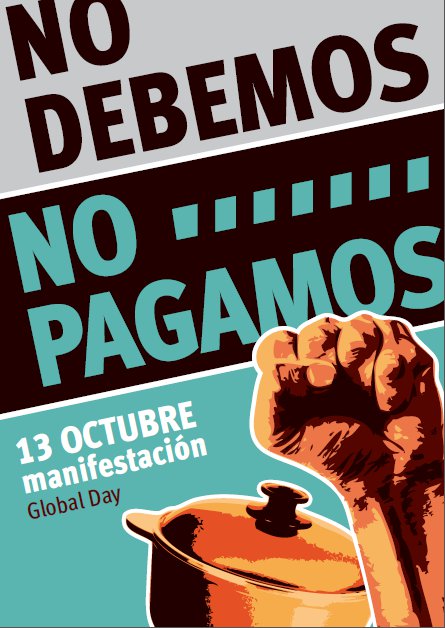The global social movements move. First it was Tunisia and Egypt that moved the Arab Spring. Then Spain set in motion the Take the Squares Movement across Europe. Last September, a group of people in New York set off the Occupy movement. Now for good reasons and bad, it’s looking as if Europe may be taking the lead again.
The bad reasons are really bad. As austerity continues to intensify, there’s a real sense of desperation and urgency.This film by Ross Domoney about the situation in Greece over the last two years shows this intensification in process.
Athens: Social Meltdown from Ross Domoney on Vimeo.
Greek dockworkers yesterday managed to occupy the defense ministry in Athens, while conservative prime minister Samaras is reduced to comparing the national situation to that of Weimar Germany. Just to calm things down, Angela Merkel goes to Greece on Tuesday and should be met by a very clear rejection of her austerity plan.
The Troika’s Orientalist plan to build a firewall around the crisis in Southern Europe and pass it off as a set of local errors, caused by laziness and inefficiency, is blowing up in their faces. Occupy Fake Democracy began a week of continent-wide action today in Strasbourg, home of the European Parliament.
On October 17 and in the week around it you’ll see actions around the world but especially in Europe. Check out Barcelona and Madrid (in Spanish) for exemplary days and weeks of action.
What makes this moment feel different to me, however, is that long-term strategizing and planning about alternatives is well underway. In November a four-day meeting called Agora 99 will bring together participants from across Europe. Here’s their call (lightly edited for idiom:
The cuts and plundering policies we are suffering are generated on a global and European level. The financial economy plays its game in a board that very much exceeds national borders.
What does this space mean for the 99%? What made millions of people feel deeply affected by what had happened in Egypt, in Tunisia, in Portugal, in Syntagma Square in Greece, on Wall Street, in Chile, in Mexico and in many other places around the globe? How does this new type of political structure work after the outburst of the Arab Spring, Iceland, Greece, after the 15th May in Spain? Even more importantly, how do we proceed?
What for?
We want to put in relation what we have learned in the square and the networks in the context of the 15M movement with the knowledge of other European and Mediterranean networks. We want to produce a space for interaction, cooperation and organization that could work at least at a European level.The aim is to end the meeting with a common working calendar and common events around the three axes (Debt, Democracy and Rights) and common working tools.
The themes of debt, democracy and rights are close to those of OWS’s S17 call relating to debt, the corruption of democracy and environmental justice.
Both sets of ideas feed into the major convergence of social movements, networks and civil society organizations called Firenze 10+10 to be held 8-11 November. The name derives from the European Social Forum that was held in the same location ten years ago but the new meeting
aims at creating a space for movements and networks to meet and to work towards the building of convergence of our struggles.
To that end 150 delegates have already met to define a set of “pillars” for the agenda in Florence:
1) Democracy in Europe
Democratic grassroots “constituent process” and development of a citizen pact and assembly; rebuilding European institutions beyond the current undemocratic treaties; migrants and the proposal of an European citizenship by residency; democratic floodwall against the right, neo-fascism and racism; rebuilding social solidarity.
2) Finance/debt/austerity
“Debt tribunal”, audit of the debt; campaigns against austerity measures and the fiscal compact; financial transaction tax etc.
3) Labor and other social rights
Labor and social rights in the time of neoliberal globalization and austerity; sustainable social development; social Pact; adequate income (wages and social protection) etc
4) Natural and social common goods + public services
Land, food, water, energy, climate and post-Rio agenda etc; the defense of territories against useless big infrastructures and projects imposed top-down; the struggle against the financialization of nature etc.
5) Europe in the Mediterranean and the world
Peace and support to the fight for democracy and peoples’ rights; War/peace and social justice; cooperation and solidarity; fair trade; denuclearization of the Mediterranean; arms trade control; “Arab revolutions”; stop the occupations; exchanges between different cultures and identities (building a bridge towards the WSF Tunisia – and the “World Social Forum-Free Palestine” in Brazil)
The gender dimension is transversal to all the pillars.
In addition to these five working groups or pillars, a sixth group will be working to co-ordinate the process of each working group towards a single agenda, comprising of a general common action in the short term, and a proposal for a joint common strategy in the long term.
There will be “demands” after all. Somehow I don’t think that all those media types are going to like them nonetheless.

